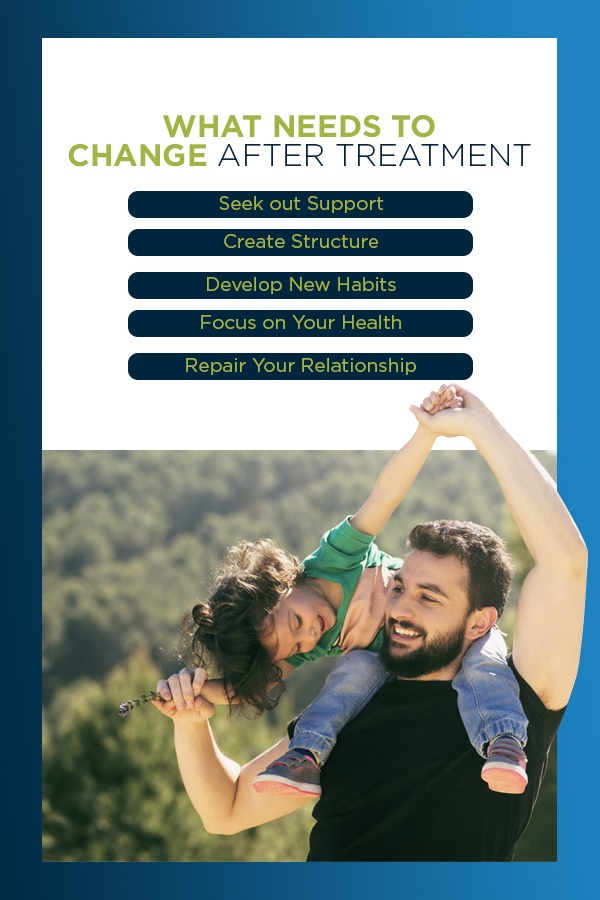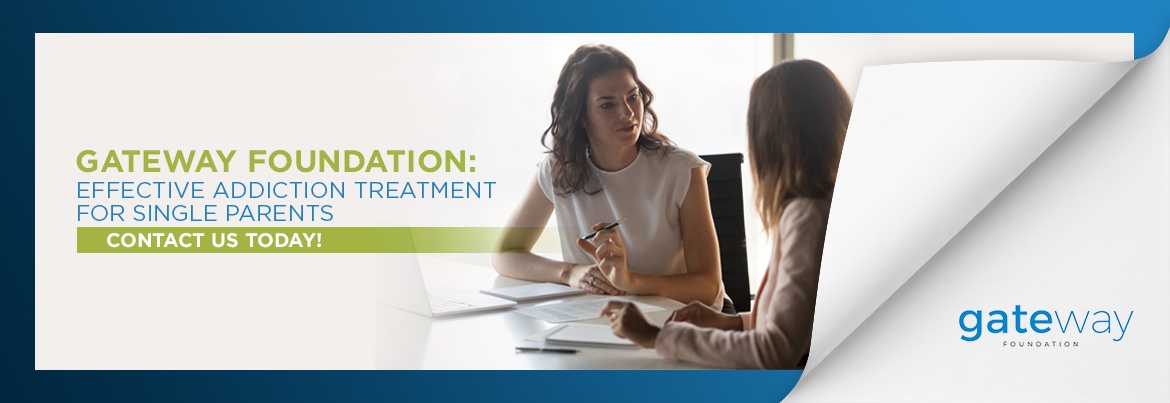- Dec 24
- Drug Addiction Treatment
Being a single parent is a hard enough job in the best of circumstances, and recovering from addiction puts more on an overloaded plate. Traditional approaches to addiction treatment often downplay or even overlook the unique struggles of parents raising kids on their own, leading to inadequate resources for parents who need them most. Understanding the specific factors that influence addiction and recovery in single parents is necessary for anyone struggling to overcome addiction while raising a child without a partner.
Single Parents and Susceptibility to Substance Abuse
Single parents are often more vulnerable to many of the factors that drive drug and alcohol addiction. These parents are raising one or more kids without another individual to help them out on financial or emotional fronts, and it can feel like the weight of the world is on their shoulders.
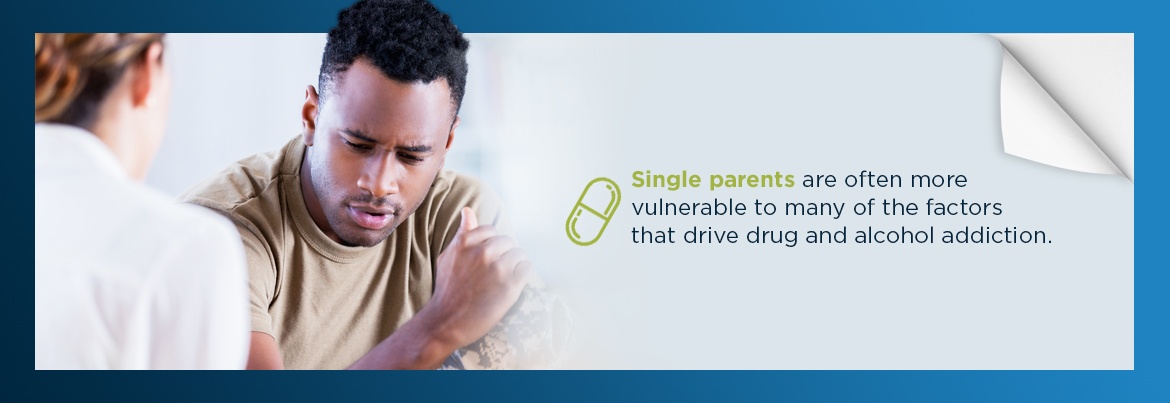 Even when things are going well, the amount of stress most single parents deal with is much higher than average. It’s easy to get into a routine where you have one or more alcoholic beverages to feel more relaxed after a long and stressful day, only to find you have begun drinking more nights than not. Alternatively, many single parents have trouble with prescription medications like Xanax®, prescribed to reduce their anxiety. No matter what the drug, addiction usually sneaks up on single parents. But what causes single parents to get stuck in the patterns of addiction?
Even when things are going well, the amount of stress most single parents deal with is much higher than average. It’s easy to get into a routine where you have one or more alcoholic beverages to feel more relaxed after a long and stressful day, only to find you have begun drinking more nights than not. Alternatively, many single parents have trouble with prescription medications like Xanax®, prescribed to reduce their anxiety. No matter what the drug, addiction usually sneaks up on single parents. But what causes single parents to get stuck in the patterns of addiction?
Fear is one of the most significant factors that keeps single parents trapped in patterns of substance abuse. The idea of having someone take your children away from you is one of the most terrifying prospects any parent can face. This fear leads many parents to hide their struggle with substance abuse, rather than seek addiction recovery for single parents to break the cycle.
There is a significant social and internal stigma associated with substance abuse, and it erodes the mental health of those who don’t seek treatment for their addiction. In addition to the existing stigma of being a single parent, it can result in continuing addiction that harms the health of the family and disrupts the healthy emotional growth of children. Drug rehab for single dads and moms is the only way to recover from the effects of ongoing substance abuse and give your children the healthy environment they deserve as they grow up.
Why Recovery Is Crucial for Single Parents
Without a partner in child-rearing, recovery is even more essential. Your child doesn’t have another parent, so if something happens to you, their life circumstances may change permanently and for the worse. There are multiple effects of substance abuse on children, all of which become magnified when the child is part of a single-parent household.
1. Emotional Disturbance
Parents who abuse substances may begin by trying to hide it from their children, but it will eventually become clear that something is wrong, even if the child can’t articulate how or why. A child’s emotional development depends in large part on receiving consistent, positive attention from the parent. When the parent becomes more and more preoccupied with using drugs or alcohol, they are unable to provide that attention.
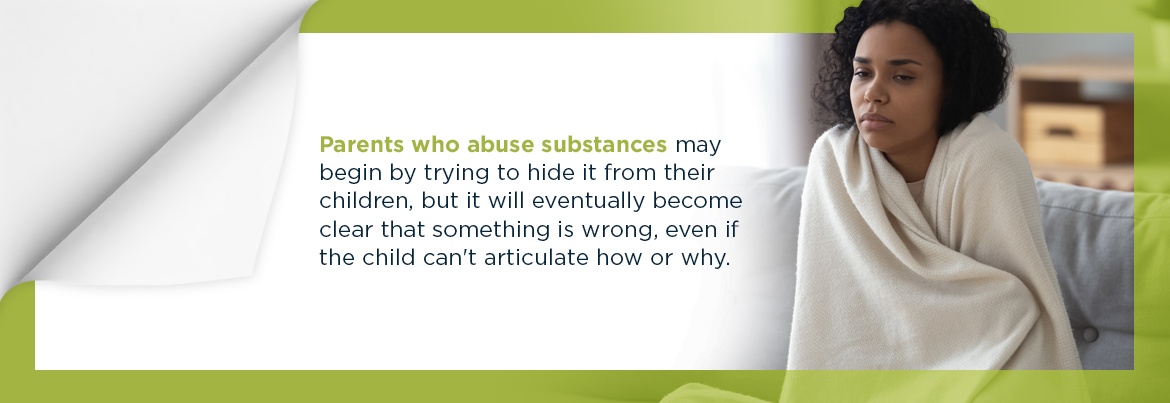
Without these skills, kids don’t have the tools to make good decisions. It is well-documented that children of people with alcohol or drug addiction are also at higher risk for common mental illnesses like depression and anxiety.
2. Psychological Effects
Life with a parent struggling with addiction is always hectic in some manner or another. Parental substance abuse deprives children of the structure they need early on in life, leaving them without an adequate support system. These kids often have to take on the role of the parent in the aftermath of substance abuse, and it can interfere with their psychological development. If a child’s parent frequently gets drunk at night and struggles to wake up in the morning, a child may take on the parental role of fixing breakfast and getting ready for school.
Kids will eventually find out they shouldn’t speak to others about a parent’s drug abuse. Whether they discover this intuitively, or someone explicitly tells them, they develop a strained relationship with the truth that can result in severe behavioral issues.
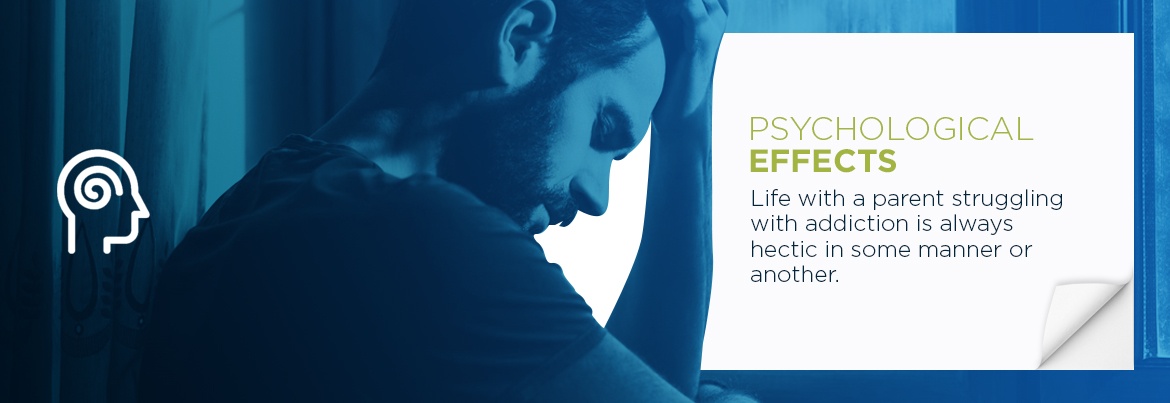
3. Physical Effects
Parental drug use can lead to physical problems in kids, too. Compared to kids whose parents do not have a substance use disorder (SUD), the children of parents with addiction are two times likelier to become seriously injured. These kids are also less likely to receive the medical and dental care they need to be healthy. Nearly one-quarter of children whose mothers have an identified SUD don’t get routine or preventive health services during the first two years of life.
Part of the physical effects is a failure to take a child to the doctor or dentist, but the home environment is a key factor as well. For example, chronic secondhand exposure to heroin or cocaine is highly detrimental for infants. Even if a child doesn’t have direct exposure to drugs or alcohol, their environment will likely reflect their parent’s drug abuse. People with addiction are less likely to clean the house frequently, and they may place little effort into creating a well-balanced diet. Both of these factors can lead to kids getting sick more and may result in poorer health throughout their lifetime.
 What to Expect When Looking for Treatment as a Single Parent
What to Expect When Looking for Treatment as a Single Parent
Once you’ve decided to take control of your life and seek addiction treatment, you need to know what you can expect. You’re worried about what your expectations will be, and how you’ll incorporate recovery into your life, so understanding your treatment options is key to choosing the best form of treatment that will benefit you and your children.
Residential Treatment for Single Parents
The most comprehensive and intensive treatment solution for addiction is residential treatment. This option affords 24/7 medical care and support in a sober environment, allowing you to focus all your attention toward recovery. The structure you’ll find in inpatient treatment can help alter the ingrained behaviors that fostered your addiction, and it eliminates opportunities for relapse. Medically supervised withdrawal in inpatient treatment can even be lifesaving in the case of severe addiction that leads to life-threatening withdrawal symptoms.
Some of the drawbacks to residential treatment are the higher cost and the fact that you will have to be apart from your child for at least a month. In cases of severe addiction, however, that separation can be necessary for the child’s well-being.
Outpatient Addiction Treatment for Single Parents
With outpatient addiction treatment, single parents can incorporate recovery into their daily lives without completely derailing schedules. The flexibility means you don’t have to unduly disrupt your child’s life, as you can schedule your treatment on evenings, weekends or whenever is most convenient to you. Part of the popularity of these programs for drug rehab for single moms and dads rests on the financial benefits. Money is tight for most single parents, and outpatient treatment offers most of the benefits of inpatient treatment without the cost of lodging.
You can expect to attend multiple treatment sessions per week, with some combination of these methods:
- Motivational interviewing
- Dual-diagnosis enhanced treatment
- Medication-assisted treatment
- Cognitive-behavioral therapy
- Family therapy
- Group therapy
 Partial Hospitalization for Single Parents
Partial Hospitalization for Single Parents
If you feel the structure of outpatient treatment might not be robust enough, but you are not in a position to opt for a residential stay, a partial hospitalization program (PHP) may be the ideal choice. During the day, you will attend the treatment center for medical treatment and therapy, but at night, you’re free to go home and sleep in your bed. For a single parent, the ability to continue interacting with your kids without too much disruption throughout treatment can be invaluable.
Partial hospitalization can also be a stepping stone. If you need residential treatment at the outset of your recovery, you can complete that program and then move to PHP as a bridge to independent living. Many single parents opt for PHP because of its balance of cost-effectiveness and structure.
Preparing for Addiction Treatment as a Single Parent
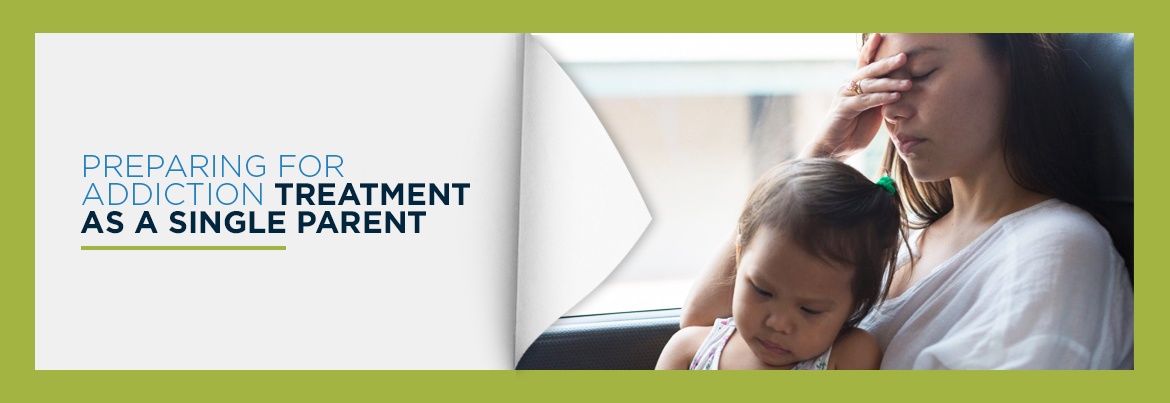
- If choosing inpatient treatment, look for a program close enough that your kids can visit regularly.
- Choose a program close to childcare or the people your child will be staying with.
- Make sure the program includes options for family therapy and support programming.
- Check with your insurance company to see what they’ll cover and what you’ll have to pay in the form of a co-pay or out-of-pocket cost.
- Investigate options for women-only treatment or men-only treatment if you believe it could be beneficial.
Ensuring Your Children Are in Good Hands
Perhaps the most challenging part of entering addiction treatment as a single parent is making appropriate arrangements for your kids while you will be in treatment. If you are participating in an outpatient program, your task may be as straightforward as finding a good babysitter for your sessions. But if you are committing to a PHP or residential program, you will need to make more significant arrangements.
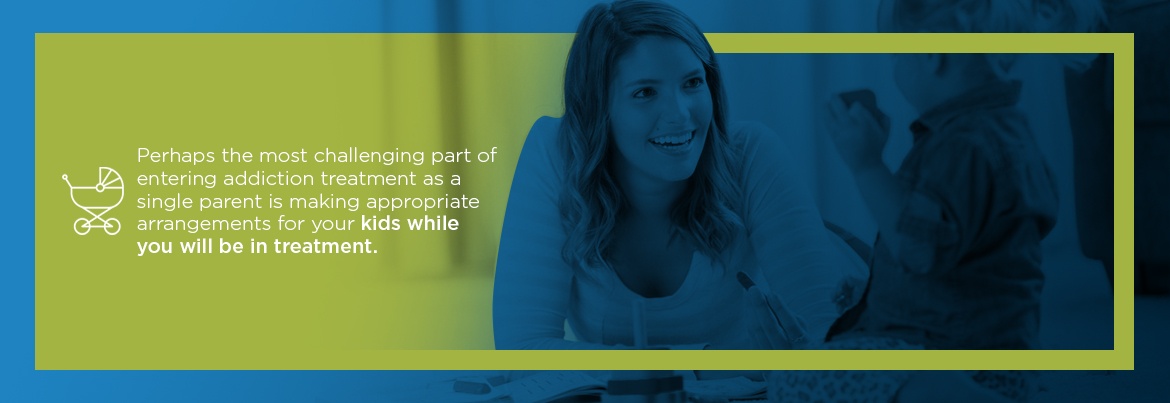
- Who consistently shows up to support you?
- Who has indicated a willingness to help with the children?
- Who has been supportive of your journey to seek treatment?
- Who will be a safe and supportive resource for my kids?
This decision isn’t one you should make lightly, but you should also remember it isn’t a permanent situation. Use resources from friends, family and your various communities to put together a list of potential caregivers, and talk to them about expectations from both parties.
Explaining Your Need for Treatment
It’s never easy to talk about your struggle with addiction, but for the experience to benefit both you and your child, you need to be as honest as possible in explaining the change. It can be hard to determine how much to tell a child and how to do it. Breaking things down by age can help give you a jumping-off point to talk to your kids about addiction and treatment.
- Younger than 10: Kids understand to some degree how it feels to want something so badly that nothing can stop you. Explain to your child that adults have this issue too, and sometimes make bad choices even though we know they hurt us.
- Tweens: Kids at this age have varying interest in the details of addiction. Give them space to ask questions, but don’t try and shoehorn in a lecture on the danger of substance abuse.
- Teens: Do not try to gloss over the situation with a teen. They’ll see right through you and may resent you for not being straightforward with them. Present the facts and how treatment will work as a solution.
Some form of explanation is crucial. If you don’t sit kids down and lay out the facts of the situation, they tend to gravitate toward the idea that your struggles are somehow their fault. When an addicted parent displays negative behaviors associated with substance abuse, a child may assume it’s because of something they did or failed to do.
Above all, reinforce the fact that you are entering treatment because you love your child and want to do everything you can to help them grow up happy and healthy. It can be a hard sell, especially when you are entering residential treatment for a month or more. When this is the case, it helps to set up an expectation of structure.
For instance, you might write a note for their caregiver to pack in lunches three times a week. Or, after investigating the schedule of your treatment, you can let them know to expect phone calls every other day and visits twice a week. For your child, your participation in treatment will feel like something of a mystery. Giving them something to look forward to and maintaining a connection throughout treatment can minimize feelings of destabilization.
What Needs to Change After Treatment
You’ve chosen addiction treatment because you love your kids, and you want to change for the better. Completing a treatment program is the essential first step to recovery, but staying sober for good requires an ongoing commitment to change. Here are five critical actions you need to take to sustain positive change throughout your recovery.
1. Seek out Support
Addiction can only develop when you shut out others and refuse to ask for help when you need it. A significant part of addiction treatment is learning how to identify times when you need help, and do the hard work of asking for it. Building up a support network can reduce the risk of relapse. Addiction recovery support groups like the 12-Step Program or Alcoholics Anonymous are a smart place to start.
2. Create Structure
A lack of structure can be both a cause and result of addiction, creating a dangerous cycle that can be hard to break. Creating structure helps you and your child healthily navigate everyday life, but how can you start introducing structure back into your lives? These tips can help:
- Give the child binary choices when possible, e.g., “Do you want an apple or a banana in your lunch?”
- Create set wake-up and bedtimes
- Schedule at least one set meal per week, such as “Taco Tuesday” or “Waffle Wednesday”
- Create routines with the same steps every day
The key to creating structure is being predictable yourself. It’s not always easy, but it’s instrumental in making your child feel safe and supported.
3. Develop New Habits
Recovery doesn’t work if you go right back to the unhealthy habits you had before you entered treatment. However, you can’t snap your fingers and make those old habits disappear. Instead, you have to replace them with new ones. Consider some of the unhealthiest routines you’ve fallen into. Maybe you got used to coming home from work and immediately sitting down with an alcoholic beverage. Replace that action with a more positive one, such as working out or intentionally spending some time asking about your child’s day.
Not only will the development of healthy habits improve your ability to avoid drug and alcohol cravings triggered by old habits, but it will also provide your child with an excellent model of intentionally choosing healthy behavior.
4. Focus on Your Health
Addiction to any substance comes with severe health consequences. You want to be around for your children for as long as possible, so you’ll need to spend some time actively building up your physical health. Nutrition is often a natural starting point for many people, and it’s an ideal opportunity to make sure your child learns the necessity of proper nutrition, too. You shouldn’t overhaul your and your child’s diet overnight, but introducing a few new healthy dishes to your weekly meals is a good place to start.
Exercise is a powerful tool in recovery as well. Without substance use to mask feelings of stress, it’s common to struggle with depression and anxiety. Regular aerobic exercise can be as effective as medications in relieving symptoms of these disorders.
5. Repair Your Relationship
No matter the age of your children, your addiction has had a powerful impact on your relationship. You can’t erase any mistakes you have made or take back any actions that have harmed your relationship, but you can work to be a better parent going forward. There’s no one-size-fits-all answer to this challenge. Letting your child know you’re there for them and providing consistent follow-through on promises are the best ways to get started with your new relationship in recovery.
Gateway: Effective Addiction Treatment for Single Parents
A single parent’s addiction recovery is challenging logistically and emotionally, and you deserve a program that respects your unique needs. Gateway has a 50-year legacy of effective, compassionate treatment, and we have proudly served more than 1 million patients.
If you’re ready to seek treatment and offer your kids a childhood without the shadow of a parent’s addiction, contact Gateway today. You can reach us at 877-505-4673 or get more information through our contact form. Don’t wait another day to take your first steps to recovery.

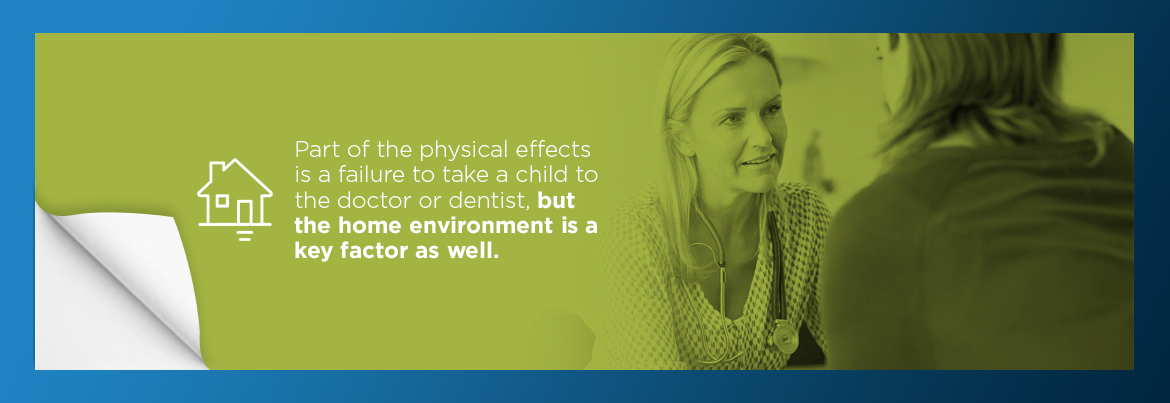 What to Expect When Looking for Treatment as a Single Parent
What to Expect When Looking for Treatment as a Single Parent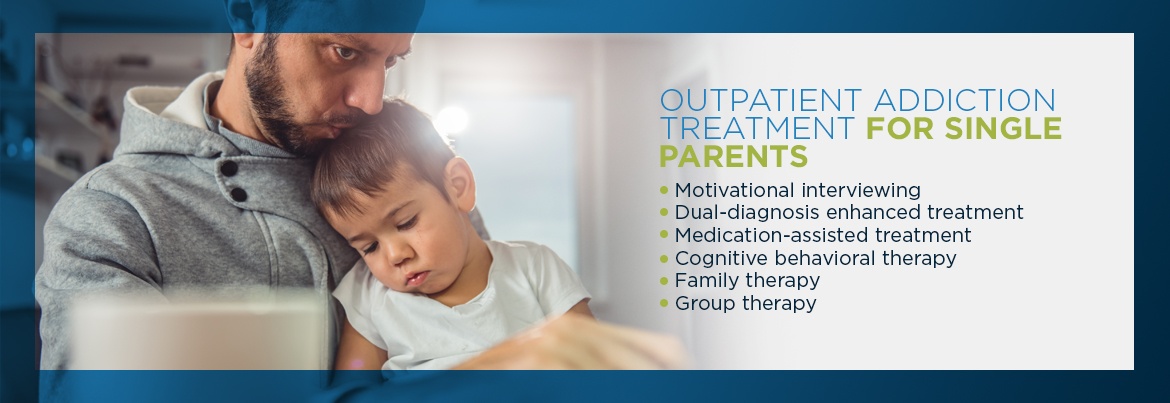 Partial Hospitalization for Single Parents
Partial Hospitalization for Single Parents